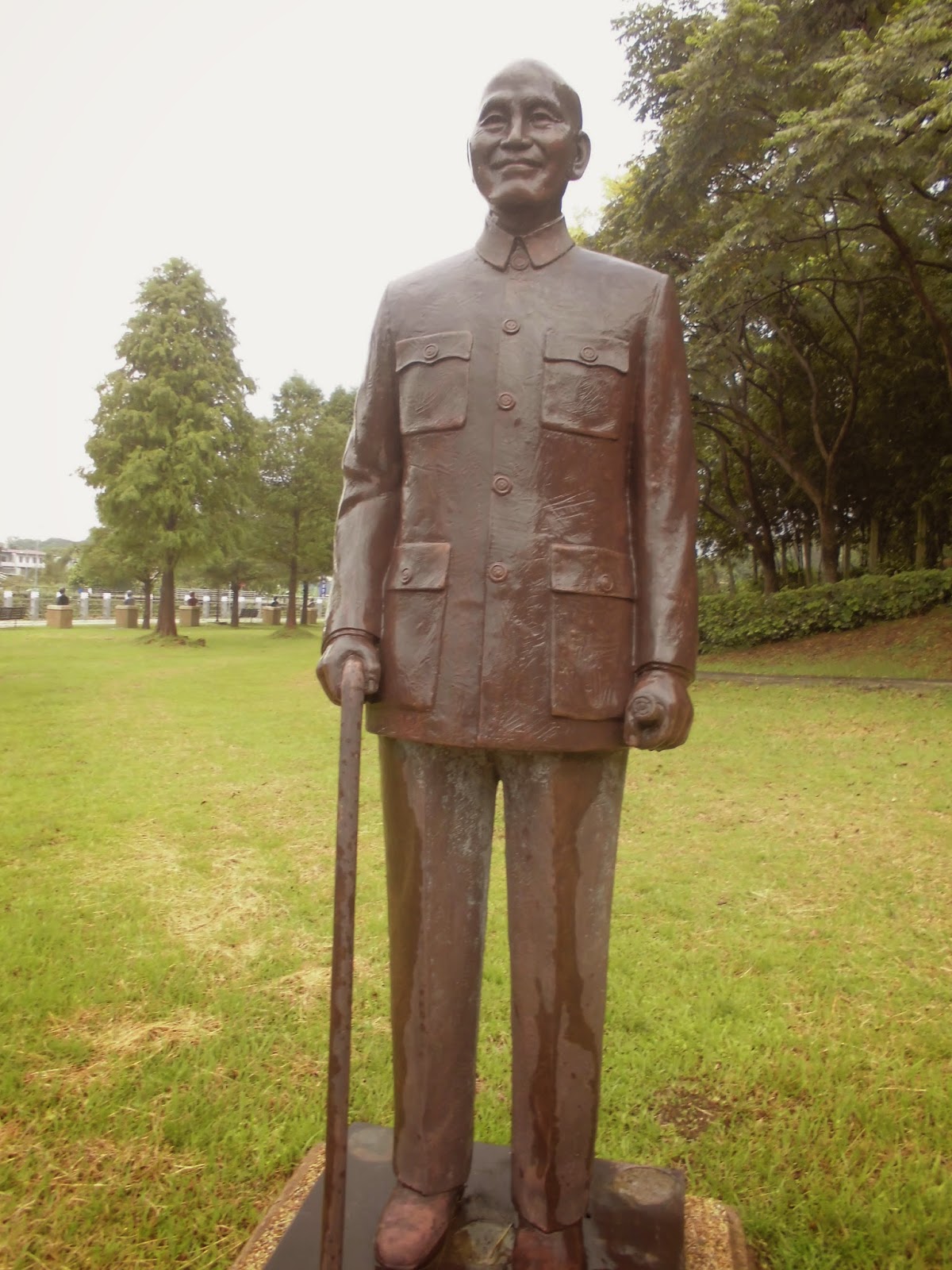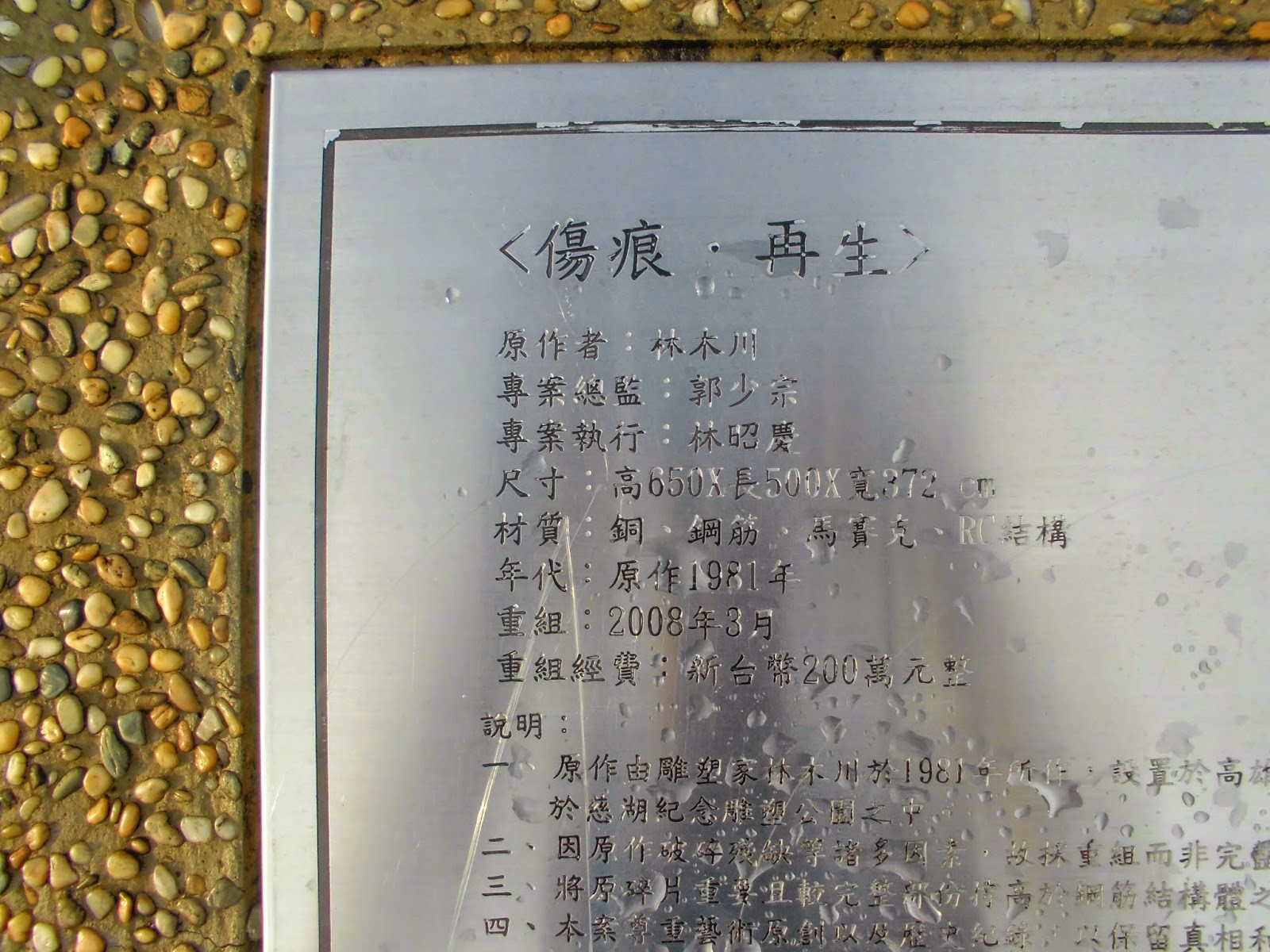We've reached Cihu, which was our original destination on this day. What is Cihu? Cihu is a park dedicated to the former dictator Chiang Kai-shek. It is also the most unintentionally hilarious tourist destination in Taiwan.
It's hilarious for a couple of reasons. First of all, it has Chiang's "temporary" tomb which he's totally just using until the Republic of China reconquers the mainland from the Communist insurgents (any day now, I'm sure) at which point he will be properly buried in his hometown.
Secondly, when Taiwan democratized in the 90's, and then elected a president from the DPP (the main political party in opposition to Chiang's own KMT) there was a flurry of activity from parks, schools, and other public institutions who decided that it was inappropriate to continue having statues of the dictator on display. Instead of just scrapping the statues, they were removed to this park. The idea was that because the park is a memorial to Chiang Kai-shek, putting the statues here would be more respectful than throwing them away, I guess. But if you know the back story here, then seeing endless row upon row of statues of the same man just looks hilarious, and also a little desperate on the part of his supporters.
Chiang Kai-shek is a controversial figure. Like Pinochet in Chile, there are, bizarrely, people who still revere Chiang Kai-shek. It doesn't help that the political party he was head of is still one of the two major parties in Taiwan, and they don't like the idea of tearing the man down too much since it brings focus to the more sordid parts of their party's past. As an example of this, despite all of the statues removed to this park, there are still a lot of Chiang statues in various schools and whatnot all over Taiwan--though some of them have been moved to less prominent locations. He's also still on the money in Taiwan, and every city, town, and podunk hamlet has a street named after him.
Here are the facts though: The man was a brutal dictator with no respect for the rights of his fellow human beings. He had people "disappeared" for criticizing him and his regime, and he instituted martial law in Taiwan for about 30 years, so I would suggest that you sit back, relax, and enjoy laughing at the pathetic, tossed-away piece of garbage that he has become here in Cihu.
慈湖(「ツーフー」みたいな発音。でも日本語にない音もあるので、なかなか仮名で表せない。)に着いた!慈湖って何かと聞いたら、蒋介石の記念公園みたいな場所だ。まだ死んでいない頃には蒋介石はこの場所がとても気に入ったらしい。
「記念公園」と言ったら、かなり堅いイメージかもしれないが、実は慈湖は台湾の一番おかしな場所だ!笑いが止まらない!なぜかというと:
1:ここに蒋介石の「臨時的な」墓場がある。中華民国が再び中国を支配したら、蒋介石をちゃんと故郷の中国に埋葬するつもりだから。(いつそうなるのだろうか?)
2:昔は台湾のどの学校、公園、広場などにも、必ず蒋介石の銅像があったと言っていいぐらい多かったのだ。しかし台湾の民主主義化が始まった90年代には、色々な学校や公園などはグラウンドの中の蒋介石の銅像を取り去ることに決めた。民主主義の国では独裁者を崇拝するのはよくないと思ったわけだ。蒋介石の支持者から見れば、銅像が捨てられたら蒋介石に失礼だから、この公園に集めることにした。支持者からすれば、蒋介石を記念して、尊敬するという意味になっているが、この銅像は元々ゴミになるつもりのものだと知っていたら、すごく風刺っぽく見えてきて、おかしくてたまらない。
死んだやつをバカにするのは道徳的に問題があると思われる方々もいるかもしれないが、蒋介石の現実を言わせてもらう:
自分の領土じゃない台湾を違法的に支配して、(日本が台湾の領土権を捨てたが、誰も中国に与えていない。これは蒋介石の独断で行ったことである)30年近く台湾で戒厳令を宣言して、台湾に住んでいる人々の権利を全く尊重しておらずたくさんの人を牢獄に入れたり、殺したり、拷問したりしてきた。蒋介石は実際に生きている人の人権を無視しやがったやつだから、もうとっくに死んでいる蒋介石に一切人間として尊敬する必要はないと思う。今日のポストは遠慮なく彼のことをボロックソに書かせてもらうのだ。
我們到了慈湖。慈湖是紀念蔣介石的公園。按照網路的資料,因為蔣覺得這裡好像他的家鄉所以他很喜歡這裡。現在有很多蔣的銅像是因為台灣開始民主主義的時候,很多學校啊,公園啊,都覺得民主主義的國家不需要紀念獨裁者,就把銅像去除了。免著很多蔣像被丟掉了,這個公園開始把它們設在園裡。知道這件事,你就知道,這些銅像都算是垃圾。支持蔣的人想設銅像紀念蔣,但是我的看法是他們紀念的不是蔣,他們紀念的是在台灣支持蔣的人越來越少的現實。
來這裡很好玩。這裡有蔣的「暫時」墳墓。(等一下,只要國民黨過去中國把那裏佔領,就可以把蔣的死體放在家鄉去。哈哈!怎麼可能!?)另外一個好玩是看這麼多地方把蔣的銅像看成垃圾,在這裡放棄了。我希望越來越多地方決定不要蔣。他是獨裁者,殺了很多人,無視人勸,一件好事都沒做。雖然通常取笑人並不是好事,但是我覺得笑蔣完全沒有問題。雖然他是人,但是他的活動像妖怪一樣。我們都來笑他好吧?
The grounds are very beautiful.Do you have your barf buckets ready? Here comes the parade!
キモいというしかないぐらい蒋介石の銅像が一カ所に集中している。どこを歩いても、同じ顔がこっちをじろじろ睨んでいる。
THEY'RE EVERYWHERE
Some of the statues are actually not of Chiang Kai-shek, but of Sun Yat-sen. Sun Yat-sen is a less controversial figure in Taiwan. For one thing, I don't think he ever set foot in Taiwan even once. When he died in 1925, Taiwan was still a Japanese colony. Sun Yat-sen was much more of a political idealist, and not a brutal dictator, so that helps his reputation too. The controversy about him is not about his actions so much as it is that, in idolizing him (his statues are still all over, he's also on the money, and every city town and podunk hamlet also has a street named after him) Taiwan is emphasizing that it is the Republic of China, and only part of China, not an independent country. Of course, that's exactly the point as far as Chinese nationalists are concerned, but since most Taiwanese people nowadays are in favor of independence, and self identify as "Taiwanese" rather than "Chinese" this makes the Sun Yat-sen worship a little out of place.
There's nothing inherently wrong or controversial with respecting a political philosopher from another country--especially since Sun Yat-sen's political ideas contributed to the current Taiwanese constitution--but since the current government of the country Sun Yat-sen is from, China, has a couple thousands missiles pointed at Taiwan lest they should dare to utter the word "independence", well, it changes the relationship with Sun Yat-sen a little.
しかし、実は銅像は全て蒋介石というわけではない。中には(下の銅像みたいに)孫文のものも混じっている。孫文は蒋介石ほど嫌われていない。まず、一度も台湾に来たことはないと思う。1925年孫文が亡くなった時には台湾はまだ日本の植民地で新しい中国政府を立てようとする孫文はたぶん台湾を気にかける余裕は絶対なかった。というか、恐らく一回も台湾のこと 考えたことはなかったのだろう。
また、蒋介石と違って、孫文は独裁者じゃなくて、かなり政治や哲学などに対して熱心があって、本人はきっと素直にいい社会を立てたかっただろう。彼の政治的な発想も現在台湾の憲法に映っているので、実際台湾にとっては大事な哲学者/政治家の一人だ。
でも何でもかんでも台湾と中国の関係が複雑で、それで孫文を拒否する人もいる。なぜかというと、彼が立てた国は台湾じゃなくて、中華民国だった。そして現在の中国(中華人民共和国)は台湾を支配したくて、いつでも台湾に侵入する権利があると主張するので、中国の歴史や人物などをあまりにもほめると、台湾が中国の一部に過ぎないと賛成している様にも聞こえる。だから台湾独立を賛成する人は孫文のような中国歴史の人物をあまりほめたくない傾向があるだろう。というわけで、孫文の銅像も結構ここにある。
還有蠻多孫中山的銅像。他應該沒有蔣那麼惡名,但是因為他是中國歷史的一個人物,然後他跟台灣差不多沒有關係,所以可能有人覺得把他的銅像設在學校是不適合的。
The statues all identify where they are from. This one is from a middle school in Kaohsiung.
元々設置されていた場所が銅像の下に表記されてある。国中=中学校
In case you hadn't had enough idolatry already, we now get to view Chiang Kai-shek in various poses! Sitting in Chinese garb:
では、本気で偶像崇拝活動に入りましょう!
中華風の服を着て座っている蒋ちゃま:
看這些蔣像,覺得他們的表情都很溫柔,我就想起來一個成語:綿裡藏針。
Sitting in western clothes:
洋服で座っている蒋ちゃま:
(This one is Sun Yat-sen.)
(孫文)
Standing!
立っている蒋ちゃま。素敵!
With a bug (or maybe bird poop) on his mouth!
鳥の糞?
Standing with a cane:
杖を持って立っている蒋ちゃま:
It's also really fun reading the signs about the statues.
來公園喝花嗎?
Here's a series of shots looking almost 360 degrees around a center point:
この周りの銅像はみんな真ん中に向いている、、、
And what's in that center point? Why another statue, of course!
ど真ん中には何があるだろう?答えは:銅像だ!
Sun Yat-sen was very popular amongst Chinese communities abroad (and he himself spent a lot of time in countries like Hawaii, Japan, and the US) and received a lot of assistance from foreign Chinese communities when he was trying to set up a new, modern China.
この孫文の銅像は以前一時的にマレーシアに設置された。孫文は色々な外国に住んでいて(実は、彼は「中山」という別名があって、それは元々日本に逃亡して隠れた時の仮名だった)清朝を倒して中華民国を立てようとした時、孫文は世界中の華僑から支援を貰った。華僑の間ではかなり人気があるらしい。
We also have tiny-head Chiang:
頭ちっちゃい蒋ちゃま:
頭怎麼了?太小了!
Hat Chiang:
帽子の蒋ちゃま:
Lecturing-on-Political-Principles-Which-He-Himself-Did-Not-Have Chiang
自分の権威を増やす以外の信念が全くなかった蒋介石がここで「三民主義」と書いている本を持って講演している様なポーズをとっている。因みに「三民主義」は孫文が考え出した政治概念だ。
Ah, here's a more honest statue. Fun Fact: Did you know that swords can be used to cut off the heads of your political opponents? Try it out at home!
蒋介石は武器を持っている方がお似合いだ。武器によって生きていたクソみたいな獣だからね!^_^
帶著武器的銅像應該是最實在。
Dandy-on-the-Town Chiang
これから出かけて映画でも見ようと思っている蒋介石。「あ〜、軽いコメディーでも見ようか!『羊たちの沈黙』がいいかな?あのハンニバル・レクターさんと本当に同感出来るね!」
This is Chiang Kai-shek's son, Chiang Ching-kuo. He's not hated as much as Kai-shek because he wasn't quite as much of a horrible monster, and ever so slightly liberalized Taiwan's government near the end of his reign, but that's about the best I can say about him.
下のは蒋介石の息子、蒋経国。(中国語だと「小ちんこ」みたいな発音になっている)
お父さんほどヒドくなかった。以上。
蔣經國。跟爸爸比起來可能好了一點。一樣,跟大便比起來鼻屎好了一點。
The rain makes it appear that he's bleeding from the eyes and mouth. I wonder if he or his father ever had anyone in custody for crimes against the state beat up so hard that they started to bleed from their eyes and mouth? Oh, what am I saying, of course they did!
雨の模様によって目と口から血が流れている様に見える。彼と彼のお父さんの支配のもとで、拷問されてこうなった人は何人いたのだろうか?
下了雨就看起來從嘴巴,眼睛,血流出來了。像被拷掠的人一樣。
The book says "San Min Jhu Yi". This was the political philosophy of Sun Yat-sen when he helped found the Republic of China. A little known fact is that this statue is based on an actual event where the artist saw Chiang Kai-shek headed to the bathroom whilst holding this book. (He was all out of constitution to wipe with, you see.)
先程書いた「三民主義」。持っているけど、きっと意味が分かっていない蒋介石。
帶著「三民主義」的蔣。誒蔣!你其實有念過嗎?知道「民權」是什麼?「民生」呢?不是「30年戒嚴」的意思。
Just a note, "spontaneous" in the sign below has a slightly different meaning than usual. Here it means: If I don't do this, the secret police might call me in to ask why I don't love the motherland and her valiant protector. (Actually, if this statue was in an area with lots of military families, the bowing may have been honestly spontaneous. Still creepy though.)
この銅像は以前小学校のグラウンドにあって、グラウンドで運動する人達は銅像の前を通った時、お辞儀をしていたらしい。キモッ。
The signs in this park gloss over the fact that most of the statues are here because they were going to be disposed of otherwise. I read the sign in front of this statue, and I looked up some stuff online, and while I couldn't find anything outright stating this to be the case, reading between the lines I suspect that this statue was headed for the scrap heap and literally saved at the last minute. It was originally on display in Kaohsiung, a city where Chiang is particularly unpopular. It seems that the government of the city decided to have the statue cut up and removed from the site very suddenly, and that the work was done at night.
公園の経営者は蒋介石を悪く言いたくないので、あまり園内の看板には書いていないが、この公園の銅像はみんな撤去されたものだ。ここに移されなかったらたぶんゴミになっただろう。下のものは明らかに分解されたのだ。ネットで調べてみたら、高雄の政府がこれを分解して撤去することを決めて、夜中に実施した。こうは書いていないが、やはり市政府は銅像を捨てるつもりがあったにしか見えない。
被分解的銅像。屁股不見了。
これは蒋介石でも孫文でもない。
另外一個中國送給台灣的東西。
The sun was starting to go down at this point.
These kids look starved and abused. Perhaps their parents disappeared suddenly one night and haven't been seen since. Horribly tragic how that happens sometimes... Don't worry kids! The Three Principles will keep you afloat I'm sure!
蒋介石と親がいきなりどっかに消えた子供。まあ、政府の悪口を言ったらこんな目に遭うのだろう。
This statue also looks like a saw may have been taken to it. Look at his head.
この銅像も分解されたみたい。頭は北斗の拳のケンシロウにやられた人の頭みたいな感じになっている。
應該這一個也被割裂了。頭很奇怪。
Pretty birds
And a giant leaf near the bus stop. We're outta here!
バス停にでかい葉っぱがあった。
I saw this ad for an English school on the bus, and I found myself thinking that they've probably never read 1984. What a creepy name for a school...
「ダブルプラス」を見て、「1984年」という小説を思い出した。
看「double plus」我就想起來叫做「一九八四」的小說。有看過的人就知道。
Still more photos to come. See you next time.
まだある。次回!
還有!再見!





































































No comments:
Post a Comment